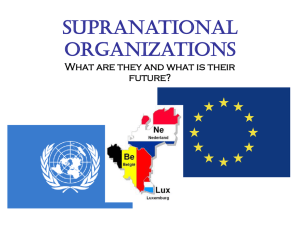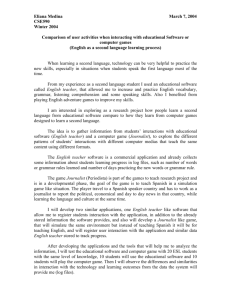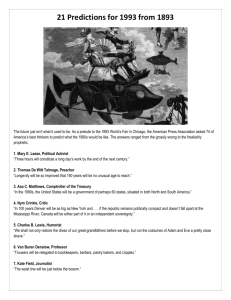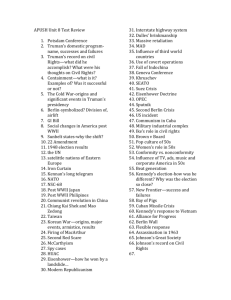Presidents & People Review - New Hartford Central Schools
advertisement
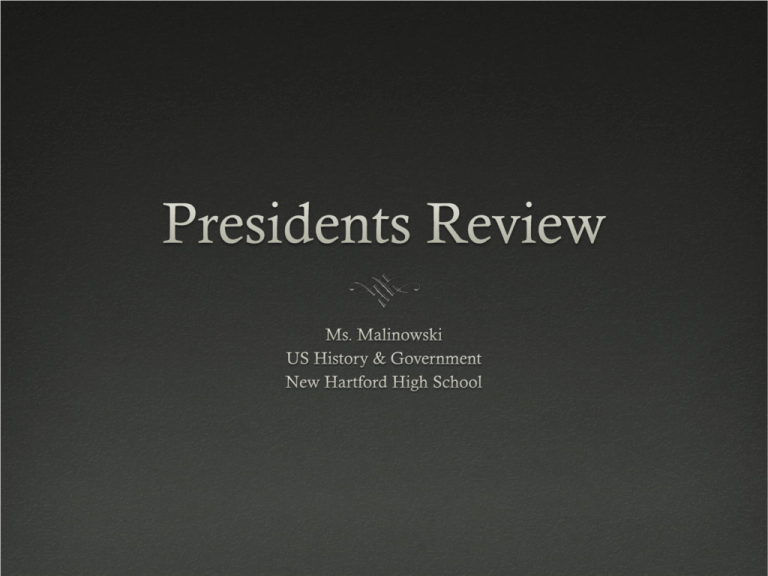
George Washington (1789-1797) Unwritten Constitution Chose not to be king No alliances (isolationist) John Adams (1797-1801) Alien & Sedition Acts Thomas Jefferson (1801-1809) Louisiana Purchase Loose interpretation of the Constitution James Monroe (1817-1825) Monroe Doctrine Andrew Jackson (18291837) INCREASED PRESIDENTIAL POWER Forced Bank of US to close Indian Removal Act Defied Supreme Court Spoils System Abraham Lincoln (18611865) Civil War Emancipation Proclamation Gettysburg Address 10% Plan for Reconstruction Assassinated Andrew Johnson (18651869) Presidential Reconstruction Impeached but not convicted Why? Violated Tenure of Office Act (passed by Congress to trap Johnson) Rutherford B. Hayes (1877-1881) 1876 Election Significance: Like 2000 election, winner did not win the popular vote Hayes won in exchange for ending Reconstruction Teddy Roosevelt (19011909) • Big Stick Policy • Roosevelt Corollary to the Monroe Doctrine • Panama Canal • Progressives • • • • Workers’ rights & safety Unions Trust-Busting Bull Moose Party - helped Wilson win in 1914 William Howard Taft (1909-1913) Continued Progressive Reforms Dollar Diplomacy 16th Amendment (Income Tax) Woodrow Wilson (19131921) WWI Fourteen Points League of Nations (US did not join) Federal Reserve New Freedom “Right is more important than peace” Herbert Hoover (1929-1933) Stock Market Crash Hoovervilles Great Depression FDR (1933-1945) Great Depression New Deal 3 Rs (Relief, Recovery, Reform) Government should help to solve social & economic problems Social Security and other assistance programs WWII Neutrality Acts Lend-Lease Pearl Harbor Harry S. Truman (19451953) Manhattan Project - Atomic bombing of Japan - ended WWII Truman Doctrine - containment (Greece & Turkey) NATO Marshall Plan Berlin Airlift United Nations Korean War Fair Deal Dwight D. Eisenhower (1953-1961) Eisenhower Doctrine - US would use force to resist communism Civil Rights Little Rock Nine Interstate Highway System NASA JFK (1961-1963) New Frontier Space Program Peace Corps Bay of Pigs Cuban Missile Crisis Assassinated Lyndon Johnson (19631969) Great Society Space Program Civil Rights Act Vietnam Richard Nixon (1969-1974) Moon Landing Détente Improved relationship with China Ended Vietnam Watergate Resigned Gerald Ford (1974-1977) Pardoned Nixon Jimmy Carter (1977-1981) Idealistic Weak economy Gas Shortages Iran Hostage Crisis Ronald Reagan (1981 – 1989) Reaganomics Conservative on social issues Arms control agreements with USSR (‘85, ’86, & ’87) FP – keep communism out of Latin America Iran-Contra Scandal George H.W. Bush (1989 – 1993) Inherited budget deficit Cold War ended Persian Gulf War Bill Clinton (1993 – 2001) Health care Social security reform Reduced nation deficit Approval of NAFTA Impeached in 1998 George W. Bush (2001 – 2009) Bush v. Gore No Child Left Behind Dept. of Homeland Security 9/11 Iraq War Treatment of prisoners Recession Barack H. Obama (2009 -) First African American president Took office facing economic crisis, high unemployment, poor housing market, rising health care costs, etc. Samuel Adams Jane Addams American Revolutionary War leader from Boston Political organizer, journalist, signer of the Declaration of Independence Boston Massacre Boston Tea Party John Brown Radical abolitionist Raid at Harper’s Ferry William Jennings Bryan Populist who supported farmers and free silver Unsuccessful presidential candidate in 1896 and 1900 John C. Calhoun Southern leader Advocated states’ rights VP under Adams and Jackson Resigned over nullification issue Andrew Carnegie Industrialist and philanthropist Carnegie Steel Company (US Steel) Social Darwinism Cesar Chavez Organized the United Farm Workers Eugene V. Debs Union organizer Socialist presidential candidate in every election from 1890 to WWI Dorothea Dix Social reformer Revolutionized mental health care Stephen Douglas Illinois Senator Kansas Nebraska Act (increased sectional differences) Lincoln-Douglas debates Frederick Douglas Former slave Abolitionist Supported women’s suffrage Attended Seneca Falls Convention W.E.B. DuBois African American Civil Rights leader Influenced Harlem Renaissance, published The Crisis Wanted civil and political equality, not just economic Benjamin Franklin Statesmen, diplomat, and scientist Albany Plan of Union Negotiated Treaty of Paris 1783 (ending Am. Rev.) Betty Friedan Women’s rights activist The Feminine Mystique NOW William Lloyd Garrison Abolitionist The Liberator Marcus Garvey African American separatist leader Ideas influenced Black Power Movement (1960s) Samuel Gompers Organizer and president of American Federation of Labor Craft union for skilled workers Alexander Hamilton Strong central government Wrote 51 of The Federalist Papers First secretary of the treasury William Randolph Hearst Newspaper publisher Yellow journalism (SpAM) Langston Hughes Poet, playwright, and novelist Harlem Renaissance Robert Kennedy Attorney general (1961 – 1963) Assassinated in June 1968 Martin Luther King, Jr. Civil rights leader Civil disobedience Southern Christian Leadership Conference Bus boycott I Have A Dream Nobel Peace Prize Assassinated in 1968 Lewis & Clark Expedition to Louisiana Purchase maps John Locke Enlightenment writer Influenced Declaration of Independence Life, liberty, & property Henry Cabot Lodge US Senator from MA In favor of imperialism (strongly influenced TR) Led fight against Treaty of Versailles and League of Nations membership Douglas MacArthur Led US troops in the Pacific in WWII Commander of US occupation forces in Japan after WWII Relieved of command by Truman after he disagreed with the conduct of the Korean War Malcolm X Leader of 1960s Black Power movement Assassinated in 1965 George C. Marshall Army chief of staff during WWII Secretary of State under Truman Marshall Plan ($$$ recovery of Europe after WWII) John Marshall Chief Justice (1801 – 1835) Marbury v. Madison (1803) McCulloch v. Maryland (1819) Gibbons v. Ogden (1824) Thurgood Marshall African American attorney Argued Brown v. Board of Education Appointed to Supreme Court (first African American to serve) Joseph R. McCarthy Senator Led campaign to root out suspected Communists in the US McCarthyism (investigations of people involved in public service and entertainment) Baron de Montesquieu French Enlightenment philosopher Admired British system of government Separation of powers Checks and balances Thomas Paine Writer Political philosopher Common Sense (pressed for independence from Britain) Rosa Parks African American civil rights activist 1955 Montgomery Bus Boycott Civil Rights Movement Francis Perkins Social reformer Political leader First woman cabinet member (FDR – secretary of labor) Matthew Perry Led 1853 – 1854 naval mission to open Japan to world trade Negotiated US trading rights with Japan Treaty of Kanagawa Joseph Pulitzer Published New York Journal Yellow journalism (helped provoke Spanish American War) Jacob Riis Journalist, photographer, and social reformer Progressive Era Need for better housing for the poor How the Other Half Lives (1890) John D. Rockefeller Industrialist Philanthropist Standard Oil Company Eleanor Roosevelt Political activist (rights for African Americans and women during the New Deal) First Lady Played a key role in the UN Commission on Human Rights (1961) Rosenbergs Couple convicted and executed for treason in 1953 McCarthyism Jean-Jacques Rousseau French Enlightenment philosopher Influenced Declaration of Independence (consent of the governed) Sacco & Vanzetti Italian immigrants and anarchists Executed for armed robbery and murder Anti-radical and anti-immigrant era of the 1920s Cleared by MA governor in 1977 (50+ years later) Margaret Sanger Advocate of birth control Founder of a birth-control lobbying group (later became Planned Parenthood) Upton Sinclair Muckraking journalist Progressive Era The Jungle (exploitation of the poor and the factory conditions that led to contaminated meat) Influenced 1906 Meat Inspection Act Adam Smith The Wealth of Nation (1776) Political economist Rejected mercantilism Free enterprise system (basis of modern capitalism) Argued for free trade, division of labor, competition, supply and demand, and laissez-faire Elizabeth Cady Stanton Advocated for women’s rights, abolition, and temperance Began women’s rights movement Seneca Falls Convention Wrote Declaration of Sentiments (1848) Lincoln Steffans Muckraking journalist Progressive Era The Shame of the Cities (1906) Wrote about corruption in government and business Harriet Beecher Stowe Writer Uncle Tom’s Cabin (Focused on slavery and contributed to the start of the Civil War) Ida Tarbell Muckraking journalist History of Standard Oil Exposed Rockefeller’s unfair and ruthless business practices Voltaire French Enlightenment philosopher Praised British institutions Influenced framers of the Constitution (against religious intolerance and persecution) Earl Warren Chief Justice (1953 – 1969) Brown v. Board of Education Miranda v. Arizona Booker T. Washington African American educator, author, and leader Founded Tuskegee Institute (1881) Up from Slavery (1901) Urged vocational education and self-improvement to gain racial equality Ida Wells African American journalist, suffragist, and reformer Launched a national crusade against lynching in the 1890s Cofounder of the NAACP John Peter Zenger German immigrant, printer, and journalist Tried for libel for criticized New York governor in his paper (found not guilty – he printed the truth) Freedom of the press


